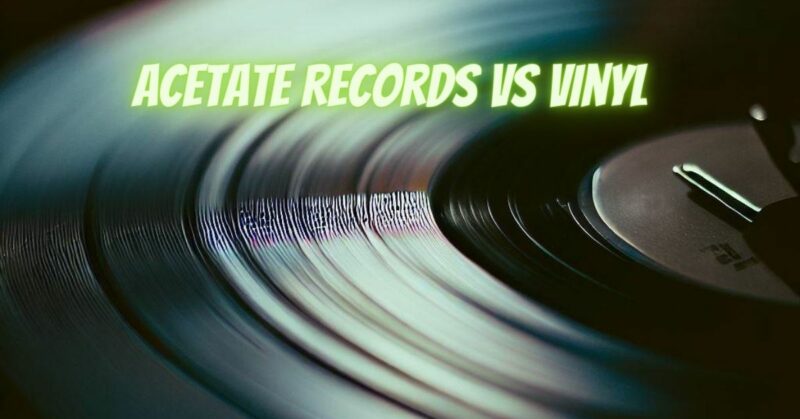The world of analog music enthusiasts is rich with diversity, from vinyl records to lesser-known formats like acetate records. Both hold unique places in music history, offering distinct characteristics that captivate collectors and audiophiles. In this article, we’ll explore the differences between acetate records and vinyl, shedding light on their origins, production processes, sound quality, and the appeal they hold for music lovers.
Acetate Records:
1. Early Stage Format: Acetate records, also known as lacquer discs, are often created during the mastering and recording process as a preliminary step before mass vinyl production.
2. Cutting Process: Acetate records are created by cutting grooves onto a lacquer-coated aluminum disc using a lathe, capturing the audio signal directly from the mastering console.
3. Fragility: Acetate records are delicate and prone to wear due to their soft material and lack of protective coating, making them less durable than vinyl.
Vinyl Records:
1. Mass Production Format: Vinyl records are the more common format for music distribution, created through a process involving the creation of metal stampers used to press grooves onto vinyl discs.
2. Pressing Process: Vinyl records are manufactured by pressing grooves into vinyl using metal stampers, allowing for mass production and greater durability.
3. Durability: Vinyl records are more durable than acetate records due to their sturdier composition and protective outer layer.
Sound Quality:
1. Acetate Records: Acetate records offer a unique sound due to their direct-cutting process, capturing nuances and imperfections that can be lost in the mass-production process.
2. Vinyl Records: Vinyl records are known for their warm, analog sound, although the sound can be influenced by factors like the quality of the mastering, pressing, and playback equipment.
Production Complexity:
1. Acetate Records: The creation of acetate records involves a more direct process, capturing the audio signal in its original form during the mastering stage.
2. Vinyl Records: Vinyl records require the creation of metal stampers and the pressing process, involving more steps and complexity in mass production.
Collectibility and Rarity:
1. Acetate Records: Due to their early-stage nature and limited availability, acetate records can hold high value and collector’s appeal.
2. Vinyl Records: Vinyl records span a wide range of releases and genres, with some rare editions and special pressings also commanding high value.
Acetate records and vinyl records offer distinct listening experiences that cater to different tastes within the analog music community. Acetate records captivate collectors with their raw, unfiltered sound and historical significance as early-stage recordings. On the other hand, vinyl records provide a more accessible and durable format for mass music distribution, known for their warm sound and nostalgic charm. Whether you’re drawn to the authenticity of acetate records or the richness of vinyl, both formats contribute to the timeless appreciation of analog music, offering unique glimpses into the art of sound.

